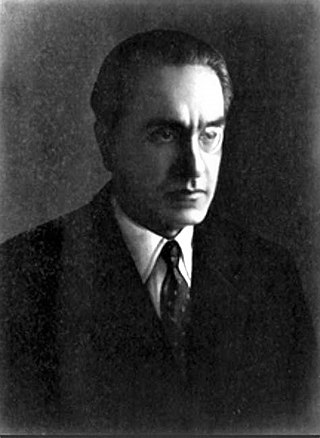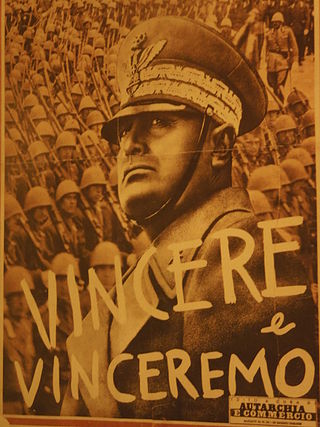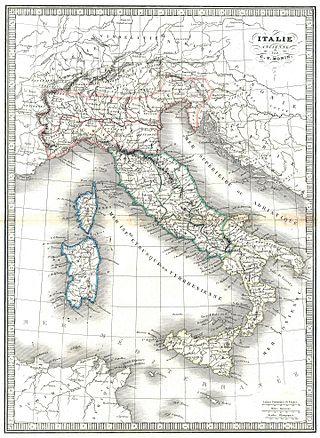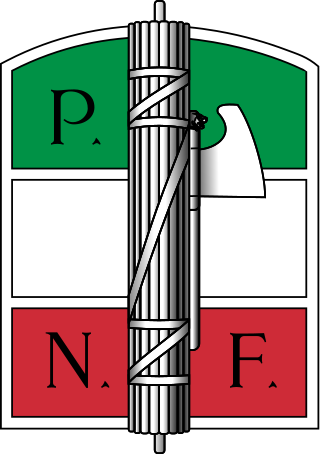Related Research Articles
ʿAbd al-Laṭīf al-Baghdādī, short for Muwaffaq al-Dīn Muḥammad ʿAbd al-Laṭīf ibn Yūsuf al-Baghdādī, was a physician, philosopher, historian, Arabic grammarian and traveller, and one of the most voluminous writers of his time.

Classics or classical studies is the study of classical antiquity. In the Western world, classics traditionally refers to the study of Classical Greek and Roman literature and their related original languages, Ancient Greek and Latin. Classics also includes Greco-Roman philosophy, history, archaeology, anthropology, art, mythology and society as secondary subjects.

Fascism is a far-right, authoritarian, ultranationalist political ideology and movement, characterized by a dictatorial leader, centralized autocracy, militarism, forcible suppression of opposition, belief in a natural social hierarchy, subordination of individual interests for the perceived good of the nation or race, and strong regimentation of society and the economy. Opposed to anarchism, democracy, pluralism, egalitarianism, liberalism, socialism, and Marxism, fascism is placed on the far-right wing within the traditional left–right spectrum.

The Greeks or Hellenes are an ethnic group and nation native to Greece, Cyprus, southern Albania, Anatolia, parts of Italy and Egypt, and to a lesser extent, other countries surrounding the Eastern Mediterranean and Black Sea. They also form a significant diaspora, with many Greek communities established around the world.

Giulio Cesare Andrea "Julius" Evola was an Italian far-right philosopher. Evola regarded his values as traditionalist, aristocratic, martial, and imperialist. An eccentric thinker in Fascist Italy, he also had ties to Nazi Germany; in the post-war era, he was an ideological mentor of the Italian neo-fascist and militant Right.

Hellenization is the adoption of Greek culture, religion, language, and identity by non-Greeks. In the ancient period, colonisation often led to the Hellenisation of indigenous peoples; in the Hellenistic period, many of the territories which were conquered by Alexander the Great were Hellenized.

The history of fascist ideology is long and it draws on many sources. Fascists took inspiration from sources as ancient as the Spartans for their focus on racial purity and their emphasis on rule by an elite minority. Fascism has also been connected to the ideals of Plato, though there are key differences between the two. Fascism styled itself as the ideological successor to Rome, particularly the Roman Empire. From the same era, Georg Wilhelm Friedrich Hegel's view on the absolute authority of the state also strongly influenced fascist thinking. The French Revolution was a major influence insofar as the Nazis saw themselves as fighting back against many of the ideas which it brought to prominence, especially liberalism, liberal democracy and racial equality, whereas on the other hand, fascism drew heavily on the revolutionary ideal of nationalism. The prejudice of a "high and noble" Aryan culture as opposed to a "parasitic" Semitic culture was core to Nazi racial views, while other early forms of fascism concerned themselves with non-racialized conceptions of the nation.

The Byzantine Greeks were the Greek-speaking Eastern Romans throughout Late Antiquity and the Middle Ages. They were the main inhabitants of the lands of the Byzantine Empire, of Constantinople and Asia Minor, the Greek islands, Cyprus, and portions of the southern Balkans, and formed large minorities, or pluralities, in the coastal urban centres of the Levant and northern Egypt. Throughout their history, the Byzantine Greeks self-identified as Romans, but are referred to as "Byzantine Greeks" in modern historiography. Latin speakers identified them simply as Greeks or with the term Romaei.
Gilles Quispel was a Dutch theologian and historian of Christianity and Gnosticism. He was professor of early Christian history at Utrecht University.

Italian fascism, also classical fascism and Fascism, is the original fascist ideology, which Giovanni Gentile and Benito Mussolini developed in Italy. The ideology of Italian Fascism is associated with a series of political parties led by Mussolini: the National Fascist Party (PNF), which governed the Kingdom of Italy from 1922 until 1943, and the Republican Fascist Party (PFR), which governed the Italian Social Republic from 1943 to 1945. Italian fascism also is associated with the post–war Italian Social Movement (MSI) and later Italian neo-fascist political organisations.

Fascist architecture encompasses various stylistic trends in architecture developed by architects of fascist states, primarily in the early 20th century. Fascist architectural styles gained popularity in the late 1920s with the rise of modernism along with the ultranationalism associated with fascist governments in western Europe. Fascist styles often resemble that of ancient Rome, but can extend to modern aesthetics as well. Fascist-era buildings are frequently constructed with particular concern given to symmetry; simplicity; and monumental size, especially for public buildings.

Jozef A. M. K. IJsewijn was a Belgian Latinist. He studied classical philology at the Katholieke Universiteit Leuven, where he became a professor in 1967. An authority on Neo-Latin literature, IJsewijn has been called "the founding father of modern neo-Latin studies". In 1980, he was awarded the Francqui Prize on Human Sciences. A collection of essays in his memory was published in 2000.

Giacomo Boni was an Italian archaeologist specializing in Roman architecture. He is most famous for his work in the Roman Forum.

The National Fascist Party was a political party in Italy, created by Benito Mussolini as the political expression of Italian fascism and as a reorganisation of the previous Italian Fasces of Combat. The party ruled the Kingdom of Italy from 1922 when Fascists took power with the March on Rome until the fall of the Fascist regime in 1943, when Mussolini was deposed by the Grand Council of Fascism. It was succeeded, in the territories under the control of the Italian Social Republic, by the Republican Fascist Party, and ultimately dissolved at the end of World War II.

Revivals of ancient Roman polytheism have taken various forms in the modern era. These efforts seek to re-establish the traditional Roman cults and customs, often referred to as cultus deorum Romanorum, religio Romana, the Roman way to the gods, Roman-Italic Religion, or Gentile Roman Religion. Several loosely affiliated organizations have emerged in the contemporary period.
Enrico Del Debbio was an Italian architect and university professor.

The Stadio dei Marmi is one of four stadiums in the colossal sports complex the Foro Italico, initially named Foro Mussolini. The other stadiums are the Stadio Olimpico, the Stadio del tennis Romano, and the Stadio Olimpico del Nuoto. It was designed in the 1920s as a complement to the annexed Fascist Academy of Physical Education, to be used by its students for training. The Stadio dei Marmi first opened in 1932, on the 10th anniversary of the March on Rome, near the Roman neighborhood Monte Mario, by the architect Enrico Del Debbio under the Fascist ruler Benito Mussolini. The Stadio dei Marmi is encircled by sixty, 4-meter tall classical statues of athletes made from Carrara marble. The stadium was built to celebrate Fascist accomplishments and the Gioventú del Littorio, the youth movement of the National Fascist Party of Italy. In its twenty-year reign, the Fascist regime used sports to introduce and instill new fascist traditions, ideals, customs, and values, with the goal of forming citizen warriors. The Stadio dei Marmi was used to host some of the field hockey preliminaries for the 1960 Summer Olympics and also hosted the opening ceremony for the 2009 World Aquatics Championships.
Jonathan Mark Hall is professor of Greek history at the University of Chicago. He earned a BA from the University of Oxford in 1988 and a PhD from the University of Cambridge in 1993 and he is the author of many books, including Ethnic Identity in Greek Antiquity, Hellenicity: Between Ethnicity and Culture, A History of the Archaic Greek World, ca. 1200–479 BCE, Artifact and Artifice: Classical Archaeology and the Ancient Historian, and Reclaiming the Past: Argos and its Archaeological Heritage in the Modern Era, as well as various articles and reviews on Archaic and Classical Greece. His focus of research is on Greek history, historiography, and archaeology. He received the Quantrell Teaching Award in 2009.

Barbara Baert is a Belgian art historian, and professor of art history at KU Leuven. In 2016 Baert earned the prestigious Francquiprijs, which is yearly awarded by the Francqui-Stichting to a scientist in human, exact and biological-medical sciences.
Hellenocentrism or Grecocentrism is a worldview centered on Greeks and Greek civilization. The worldview presupposes the idea that Greeks were somehow unique in world history and that Greek civilization essentially emerged from within itself. Nonetheless such premises have been frequently questioned.
References
- ↑ "Han Lamers - Department of Philosophy, Classics, History ..." University of Oslo.
- ↑ "Han Lamers". Bloomsbury Publishing.
- ↑ Dell'Omo, Jacopo (2021-11-18). "91. Cosa nasconde l'obelisco del Foro Italico?" (E-book). 1001 quiz sulla storia di Roma (in Italian). Newton Compton Editori. p. 608. ISBN 9788822753694.